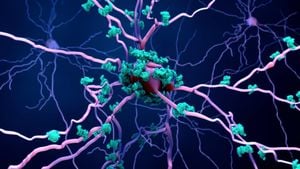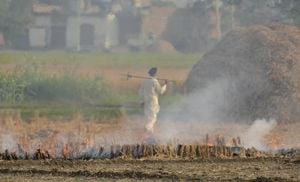Cancer prevention is becoming increasingly relevant, particularly as India grapples with the growing incidence of this disease. With the looming threat of various types of cancers, the message surrounding prevention through lifestyle modification is gaining traction across the nation. India's high incidence of cancer, especially among women, emphasizes the need for awareness and proactive measures.
Recent reports have indicated alarming statistics: breast cancer now stands as one of the most prevalent cancers among Indian women. The increased prevalence is partly attributed to lifestyle choices, indicating the importance of preventive measures. Just as one would regularly maintain their vehicle to prevent breakdowns, maintaining one’s health through lifestyle adjustments may significantly reduce the risk of developing cancer.
So, what can individuals do to lower their cancer risk? Experts suggest various lifestyle changes can make significant pressure on this issue. For starters, maintaining a healthy weight is pivotal. According to health studies, excess weight is associated with increased production of insulin and estrogen, which encourages the growth of certain cancer cells. This corresponds to the recommendation of engaging in regular physical activity—best described as both moderate and intense activities—as they play roles not just in weight management but also overall health.
A recent analysis highlighted the impact of physical activity on health, making it more than just about keeping fit. Staying active is not necessarily limited to hitting the gym; it encompasses walking, cycling, or any form of exercise integrated smoothly within daily routines.
Alongside exercise, another definitive measure involves saying “no” to tobacco. Unquestionably, tobacco use retains its position as a leading cause of various cancers, including lung, mouth, and bladder cancers. It's not just smokers who face risks; second-hand smoke also poses hazards. The call to avoid tobacco is not merely about personal choices but also about fostering healthier environments for ourselves and everyone around us.
But the conversation shouldn't stop there. Protective habits also include skin care practices like wearing sunscreen. Sun exposure is linked to skin cancer incidence, which is largely preventable with diligent sunscreen use. The culture surrounding sun protection is rising; more individuals are becoming conscious of protecting themselves from harmful UV rays, which bombard the skin during daily activities.
Equally important is the awareness of one’s family health history. Understanding genetic predispositions allows individuals to remain vigilant for early signs or pursue preventive screening suitable for their backgrounds. This necessitates discussions with families and healthcare professionals about potential risks and the most appropriate screenings.
Further reinforcing the call for lifestyle modifications, experts contend it’s not just one habit but rather collective lifestyle choices over time. Eating nutritious foods—natural and unprocessed—plays a significant role, the same as managing stress levels. Nutritional choices, stress management practices like mindfulness or yoga, and maintaining social connections form the cornerstones of holistic health and can make notable differences.
During National Cancer Awareness Day, celebrated every November 7, the discourse around these necessary lifestyle shifts amplifies. The theme this year, “Hope, Love, and Strength: Our Weapons Against Cancer,” reflects the united front against this complex disease. Engaging communities to adopt healthier lifestyles and schedules can create ripples of positivity aiding individual and communal health.
Importantly, not all individuals face the same risk. Those with familial health histories of cancer must engage healthcare professionals more actively. Family histories can be substantially informative, guiding individuals on necessary check-ups or screening times. A proactive approach to one’s health shape not only preventative strategies but also improve outcomes significantly.
While it seems simple, changing daily habits takes commitment. Starting small—perhaps by taking those proverbial stairs instead of the elevator, or swap out unhealthy snacks for fresh fruits—can begin meaningful progression. Progress doesn’t have to mean perfection; even slight changes can lead to substantial health benefits over time.
Indeed, the path to cancer prevention may seem steep, but it is paved with informed choices, heartfelt support, and sound practices. Engaging government and private institutions reinforces the vision of increased awareness, thereby empowering citizens with knowledge and accessibility to health resources.
Reflecting on overarching health measures also leads to the inclusion of public health initiatives focusing on access. Campaigns offering free screening or workshops on healthy living pervade communities, cultivating environments ripe for health conversations.
To small and large groups alike, the focus remains clear: we all have the power to influence our futures through the choices we make daily. The lessons are clear: to live healthier is to live longer, to engage more with our external environments is to care for those who will follow—those are worth fighting for.
With changing dialogues around health, breaking the stigma surrounding conversations about cancer is equally important. Sharing experiences can illuminate shared journeys, creating supportive networks and fostering resilience.
Resilience can be as powerful as treatment once cancer is diagnosed. For many, hearing about survivors' stories or participating in community support groups brings hope, showcasing the incredible strength found within communities coming together.
Finally, as people celebrate National Cancer Awareness Day, it’s imperative to reflect not only on the diseases but on how through lifestyle changes, communities can contribute to lowering risks collectively. Knowledge spreads, awareness creates action, and together these elements provide the groundwork for fundamental lifestyle changes poised to benefit immense populations today and generations to come.



